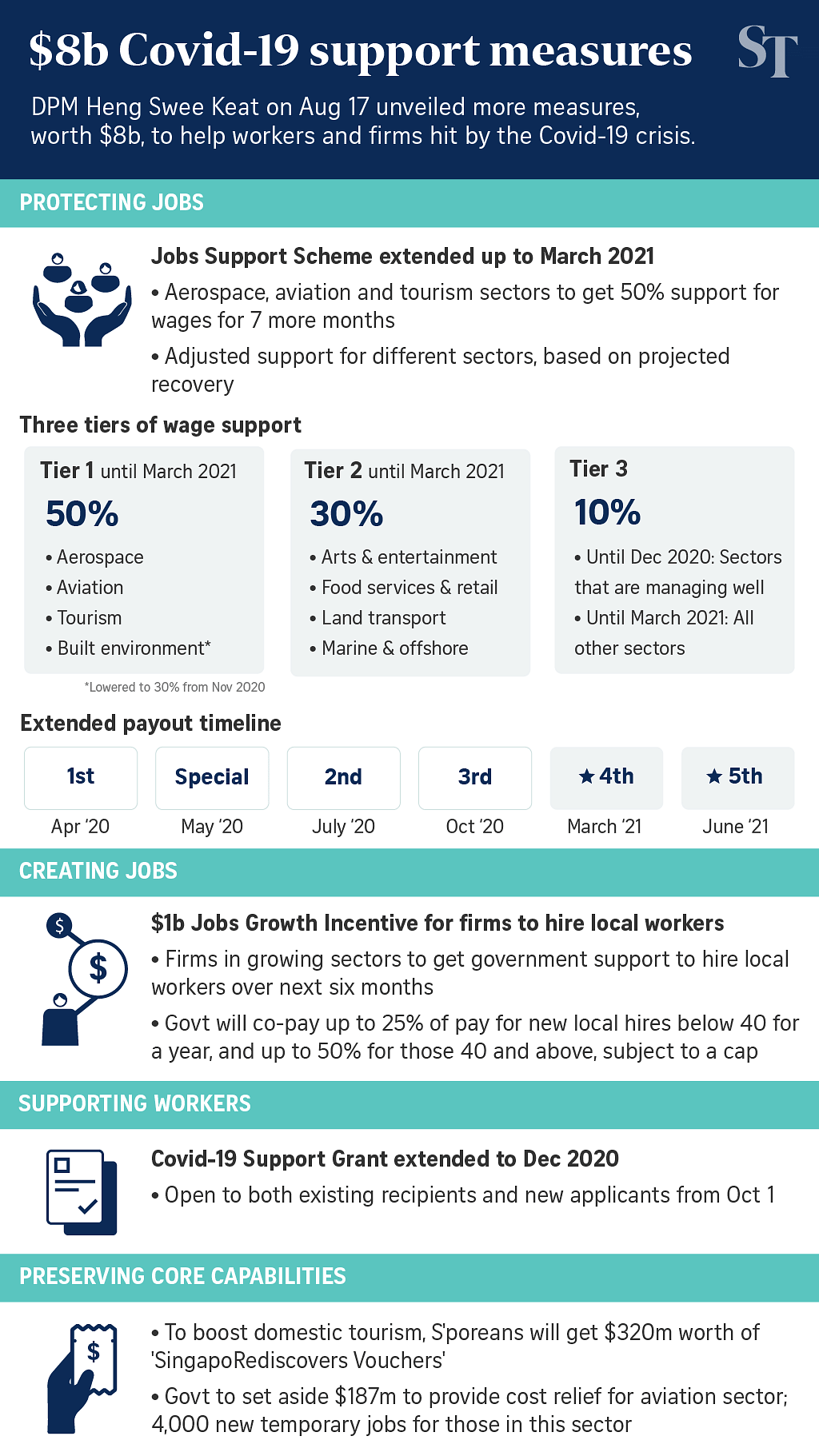DPM Heng announces $8 billion more in Covid-19 measures, extends Jobs Support Scheme
Sign up now: Get ST's newsletters delivered to your inbox
SINGAPORE - A scaled-back version of the Jobs Support Scheme (JSS) will continue to help workers, and $8 billion more will be spent to save jobs, create new ones and seize new growth opportunities, said Deputy Prime Minister Heng Swee Keat.
In a ministerial statement on Monday (Aug 17) carried via live broadcast, Mr Heng said that as the global economy remains very weak and measures such as the JSS are ending soon, it is timely to look at three areas: continue to support jobs and create new ones; provide further support for sectors that are hit the hardest; and position Singapore to seize growth opportunities in a post-Covid-19 world.
He added that some measures will be extended, such as the JSS to help firms retain local workers, and the Covid-19 Support Grant (CSG) for Singaporeans who are unemployed or have suffered significant income loss.
Over $16 billion of JSS payouts have been disbursed, benefiting more than two million local workers in more than 150,000 firms.
"However, we cannot sustain the JSS at current levels. It draws heavily on our reserves and risks trapping our workers in unviable businesses. Some sectors are also recovering faster than others," explained Mr Heng, who is also Finance Minister.
Hence, while JSS, which covers wages up to August, will now be extended to cover wages paid up to March 2021, the support is adjusted based on how quickly each sector is expected to recover.
Firms in the hardest-hit aerospace, aviation, and tourism sectors will get 50 per cent wage support for seven more months.
The built environment sector will get the same amount of support for two more months before it is lowered to 30 per cent of wages paid up to March 2021, in line with the phased resumption of construction activities.
Most other sectors will get 10 per cent support for seven more months.
Those that are doing well, such as biomedical sciences, financial services, and infocommunications and technology, will get 10 per cent support up to December.
"Even at 10 per cent support, the payouts cover more than half of employers' Central Provident Fund (CPF) contributions. This ensures that we continue to build up the CPF savings of our workers during the crisis," said Mr Heng, adding that businesses can also tap existing schemes such as the enhanced Enterprise Financing Scheme and the Temporary Bridging Loan Programme, which are available until March 2021.
The CSG, which was introduced in May to help Singaporeans who have been laid off or have suffered significant income loss, will also be extended to December and will be open to both existing recipients as well as new applicants.
To qualify, unemployed applicants must demonstrate job search or training efforts. The application window, which was slated to end in September, will now reopen on Oct 1.
More lower-income workers will stand to receive the $3,000 cash payout under the Workfare Special Payment.
Currently, those on the Workfare Income Supplement scheme for work done in 2019 are eligible. This will be widened to include those who were not on the scheme last year, but have received or will be receiving workfare for work done this year.

A new $1 billion Jobs Growth Incentive programme will also be launched to support firms to increase their headcount of local workers over the next six months.
Under the programme, the Government will co-pay up to 25 per cent of the salaries of new local hires for one year.
The co-payment increases to up to 50 per cent for workers aged 40 and above, with the Manpower Ministry to give more details later this month.
To preserve the core capabilities of the hardest-hit sectors, another $187 million will be used to support the aviation sector, and $320 million set aside as SingapoRediscovers Vouchers - or tourism credits - that Singaporeans can use to explore local culture and heritage.
To prepare for the next phase of economic transformation, up to $150 million will be used to enhance the Startup SG Founder programme in phases, which provides mentorship and start-up capital grants for first-time entrepreneurs with innovative business ideas.
The measures announced on Monday come on top of the nearly $100 billion committed under the four Budgets this year.
They will be funded by reallocating monies from other areas, such as development expenditures that were delayed because of Covid-19.
There are no plans to draw on past reserves beyond what was approved earlier, said Mr Heng. To fund its Covid-19 response, the Government had obtained President Halimah Yacob's approval twice this year to draw up to $52 billion from past reserves.
Mr Heng's statement comes amid a deepening recession, with gross domestic product shrinking by 6.7 per cent in the first half of the year.
In the second quarter, the economy contracted by 13.2 per cent year on year, sharper than the 12.6 per cent plunge earlier estimated and the worst on record.
Retrenchments more than doubled in the second quarter, with 6,700 workers laid off, up from 3,220 in the first quarter. This was higher than the peak of 5,510 during the 2003 severe acute respiratory syndrome or Sars outbreak, but below the high of 12,760 during the 2009 global financial crisis.
Mr Heng acknowledged that it will be a difficult journey ahead, but assured Singaporeans that they will not walk alone.
He said: "We are faced with an extraordinary crisis, but we are one people with extraordinary courage, commitment and can-do spirit.
"We have the fortitude - to improvise, adapt and overcome the uncertainties. We have the resilience - to weather the difficulties, turn challenges into opportunities and prepare for the future.
"And we will stand in solidarity as one united Singapore - to beat this crisis and emerge stronger as a nation."
Read Mr Heng's ministerial statement in full.


